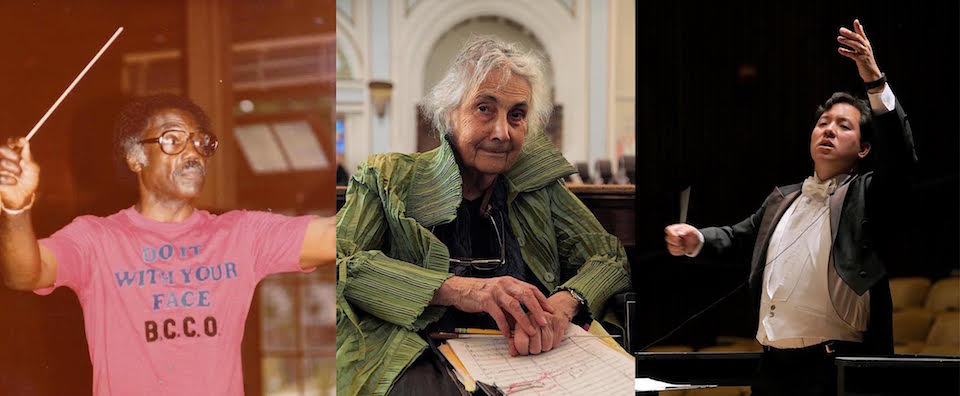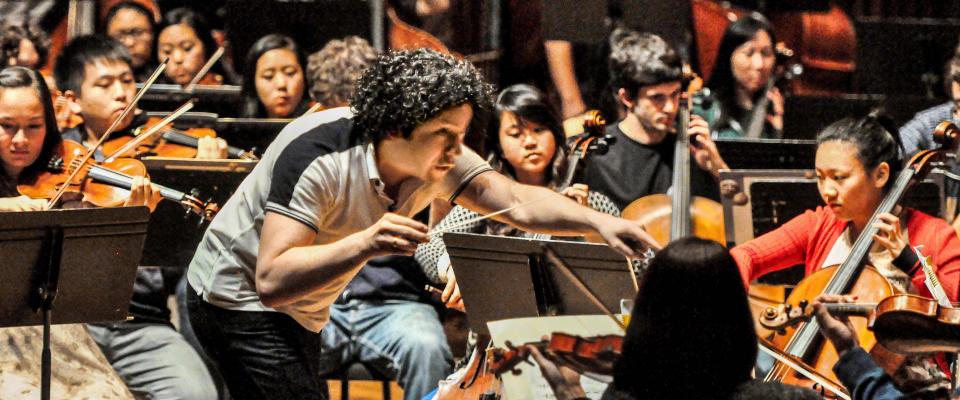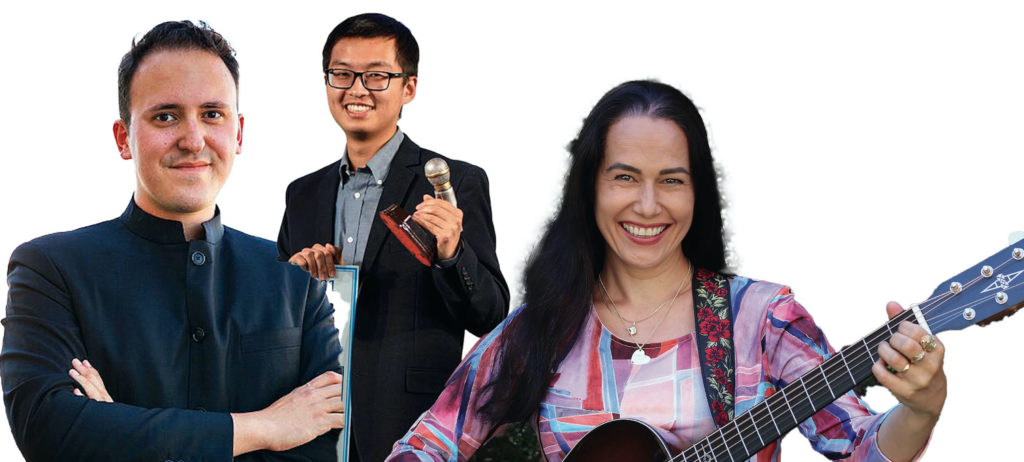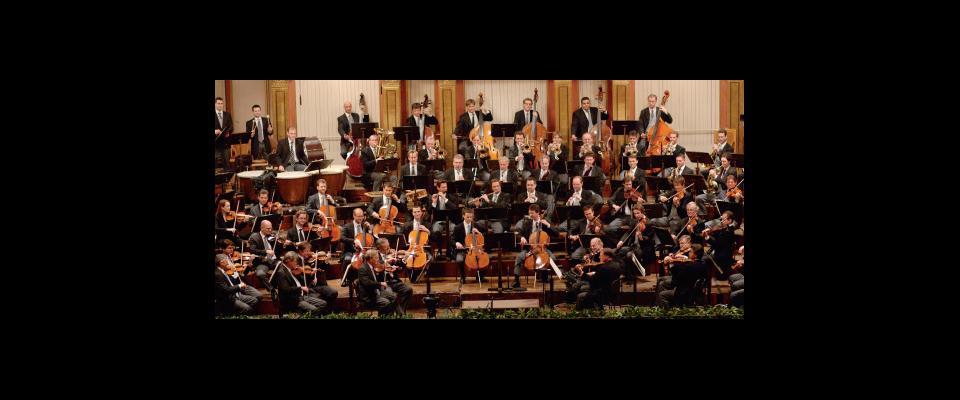Fifty years after its founding as a program of the Berkeley Adult School, the Berkeley Community Chorus and Orchestra (BCCO, for short) is going stronger than ever by remaining true to its two founding principles: amateurs only, and no auditions. Membership has zoomed from 20 people to 220, and there would be even more if BCCO could find a larger rehearsal space. And the quality of the musicianship has never been higher.
“‘Amateur’ just means you’re not getting paid, and ‘professional’ just means you’re getting paid. Both can be highly skilled,” says Ming Luke, who is only the third conductor/musical director in the chorus’s history. He reminds me that the word ‘amateur’ comes from the Latin ‘amare,’ which means love. “So it’s a very special group because they really connect with the music.”
A good chorus, one like BCCO, can perform at about 85 percent of its ability without a conductor, he says. “A conductor can add to that percentage—or detract from it.” There are days they need a cue or help with phrasing or, they may just need him “to psych them up, he says. “The arms have very little to do with the actual art of conducting. Leonard Bernstein once conducted the Vienna Philharmonic in a Haydn symphony with only his eyebrows.”
But doesn’t the no-audition policy make it hard to maintain the musical quality?
“Not at all,” Luke says. “Every single person in the chorus has an artistic voice, whether they have a lot of experience or not. Part of my job is to encourage them to be comfortable with that voice. Keeping them away from their insecurities allows them to achieve much more than they thought they could.”
The singers agree. “It takes the terror out of joining a chorus,” says Debra Golata, a sectional leader of the alto section. “There are people with spectacular voices who just could not face the audition process.”
“The idea that someone’s going to judge you can be so intimidating,” adds her fellow alto, Janice Murota. “So many people in the chorus have told me, ‘When I was a kid I was told not to sing; just mouth the words.’ Here, they get to sing.”
BCCO founder Eugene Jones envisioned a chorus of non-auditioned singers and an orchestra drawn from the community that together would perform choral masterworks in free concerts for the general public. It was also his answer to the widespread racism in society he knew only too well from his experiences in the Oakland Fire Department.
As a sectional leader, Golata’s task is to help singers in her section who are having difficulties.
“When I find someone who’s not on pitch, I’ll sidle up to them and encourage them to find their own voice by just adding a little ‘woo-woo-woo’ siren sound, as opposed to a spoken sound. There’s a difference between your spoken voice and your singing voice, so I ask them to go for the feeling of the singing instead. We’ll also position the stronger singers on the top row in back, so the weaker singers in front can hear them.”
Another big help for newbies is the “one-room schoolhouse” policy inaugurated by Arlene Sagan, Luke’s immediate predecessor as conductor/musical director, which encourages more experienced singers to take newcomers under their wing and mentor them.
“Arlene recommended that you find a buddy who sings better than you did and sit next to them, and I found one—Lynne Churchill,” says soprano Patti Powers-Risius, who joined the chorus in 1993. “She could hit that first note perfectly, and once I heard it get started, I was OK. We’re still friends after all these years.”
“Very few people in the world are actually tone deaf; they just think they are,” adds soprano Janelle Noble, who got her PhD in genetics and immunology from Cal in 1992. “If you can’t find the perfect pitch but the person next to you is on perfect pitch, just being near them helps you find it.”
BCCO was founded in 1966 by Eugene Jones, one of the first African-American firefighters in the newly integrated Oakland Fire Department. He envisioned a chorus of non-auditioned singers and an orchestra drawn from the community that together would perform choral masterworks in free concerts for the general public. It was also his answer to the widespread racism in society he knew only too well from his experiences in the OFD.
“It was dangerous for black firefighters in white firehouses,” says his daughter, Jeneane Jones. “There were times when he was left alone in burning buildings. The other firefighters would pull out and not tell him.”
He was also subjected to the silent treatment. “Nobody would talk to him, and my mother would have to cook all his meals and bring them to the firehouse because they wouldn’t let him eat with them. My father developed an ulcer from the stress.”
The possessor of a powerful bass voice, Jones sang with the Oakland Light Opera and the San Francisco Municipal Opera Chorus during the 1950s, but that career, too, was ultimately closed to him because of his race. So he founded BCCO, becoming the Bay Area’s first African-American conductor of a large chorus and orchestra.
“It kept his sanity,” says Jeneane, who grew up playing violin in the BCCO orchestra. “It was a way for him to keep fighting. He was determined to create what people were denying him—a platform to sing the music that he loved and could craft in ways that were as brilliant as what the opera stage could provide.”
And he knew how to create a sound that was more than just the sum of its parts.
“He had an ability to draw a tone out of voices, 20 people all on the same breath pattern if you wanted an extended tone,” she says. “Or if you wanted staggered breathing so you couldn’t hear where the phrase stopped, he could show the singers how to do it.
Jones was deadly serious about his mission, but he also had a puckish sense of humor. “He wore T-shirts to rehearsals sprayed with slogans like ‘Watch The Stick,’ ‘Remember to Breathe,’ or ‘Squeeze Your Buns,’ which he said gives support to your core,” recalls Borders, smiling at the memory. “Then, at the concert, he’d wear the same T-shirt under his tuxedo and tap his chest from time to time to remind us.”
“But he wasn’t just teaching vocalization, he was infusing the music with drama. One of the things he had from his operatic training, he was an actor. The main piece we did in the early years was Handel’s Messiah. While we were practicing one of the later arias, ‘By Man Came Death,’ he was trying to get the chorus to create a cross between the doom of death and the somberness of Jesus’ sacrifice, and he did it by talking them through what the Scriptures were and how the story was being told at the time the piece was composed. I would sit there mesmerized because I could see the chorus deliver their interpretation of what he was saying and emulate that same sense of awe and sadness. To have those two co-exist was an amazing thing to be part of.”
“He would sing the same passage over and over until you got it,” says soprano Mary Borders. “And his voice had other uses, too. We were doing a concert at Berkeley High when a kid hit the fire alarm as a prank. People started to panic, but that was stopped dead in its tracks when over all the noise came that big, booming voice saying calmly, ‘Do not be alarmed. That’s the fire alarm. It’s all right.'”
Jones was deadly serious about his mission, but he also had a puckish sense of humor.
“He wore T-shirts to rehearsals sprayed with slogans like ‘Watch The Stick,’ ‘Remember to Breathe,’ or ‘Squeeze Your Buns,’ which he said gives support to your core,” recalls Borders, smiling at the memory. “Then, at the concert, he’d wear the same T-shirt under his tuxedo and tap his chest from time to time to remind us.”
For many years, Jones suffered from glaucoma, a progressive disease of the eyes that reduced his field of vision, making it difficult to read a musical score in its entirety. “But he never let that stop him,” says Jeneane. “For him, all that meant was studying the music more and memorizing the scores.”
With equal amounts of persistence, charisma, talent and devotion, Jones led BCCO for the first 22 years of its history until he retired in 1988. When he died on Sept. 26, 2003, many longtime BCCO singers sang at his memorial service.
His successor was Arlene Sagan, who graduated with honors from Cal in 1975 at age 63 and went on to get her M.A. in education and musicology from Cal State Hayward.
“She was a trip,” says alto Karen Davison, who vividly recalls the first time she met Sagan. “I had no interest in singing, just a little video business, and I went to her house to interview her. I walked in, and it was crammed with scores and books up to the ceiling in utter disarray. She had no vanity whatsoever. She was wearing very old ripped clothes, her cuffs were separated from her sleeves, her hair was messy.
“But then she started to talk, and she was so electric, so passionate, so fierce and smart, and her brain was going in so many directions, I just fell in love with her. For her, music and politics were all of a piece. She spoke very passionately about music being everyone’s birthright and no one should be shut out of making music. And she was fiercely committed to social equality.
“I was so infatuated after the interview, I thought, ‘Well, I’ll join the chorus for one semester and see how it works out. I had no idea it would be so compelling on so many levels—emotionally, spiritually, even physically. So I never left.”
“She had a kind of stream of consciousness thing going when she was up in front during rehearsals,” says alto Eileen Flanagan of Jones’ successor Arlene Sagan. “She talked very fast and moved quickly from topic to topic. I never had a problem following her, but plenty of people did.” One of them was soprano Patti Powers-Risius, who says, “The problem was finally solved when Meyer Sound installed a new, state-of-the-art sound system for us. All of a sudden, everybody could understand Arlene!”
Fascinating as Sagan’s monologs were, there was only one problem: Hardly anyone could understand them because she tended to mumble.
“She had a kind of stream of consciousness thing going when she was up in front during rehearsals,” says alto Eileen Flanagan. “She talked very fast and moved quickly from topic to topic. I never had a problem following her, but plenty of people did.”
One of them was soprano Patti Powers-Risius, who says, “The problem was finally solved when Meyer Sound installed a new, state-of-the-art sound system for us. All of a sudden, everybody could understand Arlene!”
All the singers agree that Sagan’s greatest gift was her collegial leadership.
“She almost ignored mistakes,” says Powers-Risius. “She might say, ‘The bass section is flat; let’s do it again,’ but she didn’t pick out individuals and criticize them. That was not her style, which made you feel secure.”
When Sagan assumed the reins BCCO had only 30 members. By the time she retired membership had grown fivefold, and the repertoire had expanded to include ever more challenging works, including Bach’s B Minor Mass, Gounod’s St. Cecilia Mass, Orff’s Carmina Burana, Brahms’ Requiem, and Verdi’s Requiem.
“To see us become an organization that could do the Britten War Requiem, as we did last spring, I mean it takes a lot to put on this big-time piece,” says Flanagan. “It’s not something this organization would have taken on in the ’90s. That, too, is due to Arlene and her vision.”
In addition to leading BCCO, Sagan founded the Bella Musica Chorus and was musical director or conductor for the 12-voice Point Richmond Singers, the Berkeley Community Chamber Singers, the East Bay Chapter of the American Recorder Society, the Pacific Boys Choir, Revels Bell Choir, the El Haefronaim Choral Group, the Jewish Women’s Choir, and the Sine Nomine Singers. She was a founding member and accompanying pianist for the Bach Cantata Society, coordinator of the introductory program at Cazadero Music Camp, an instructor at the UC Berkeley Young Musicians Program, hosted Odyssey to Music (a program of medieval and Renaissance music) on Chicago’s Radio WSMT, and was Director of Children’s Programs for KPFA-FM (and the first female announcer/on-air engineer for the station).
But Sagan’s first love was always BCCO, and her devotion to it was legendary.
“We were having a retreat at Cazadero, and one Saturday morning someone came up to her in the middle of a rehearsal and tapped her shoulder to tell her that her son was dying,” remembers Golata. “The nearest phone was at the ranger’s office several miles away, so we all went outside and waved goodbye to her as she drove away. Before she got in the car she turned and said, ‘YOU are my family!’ Even then, the chorus was her life. And it wasn’t long after his death that she was back at rehearsal.”
Sagan was honored as Citizen of the Year in 2006 by the Berkeley Community Fund, and in 2011 the City of Berkeley declared her a “Local Legend … a cultural icon … one of those wonderful people who embody the aspirations and ideals of Berkeley.”
But in 2010 she fell ill and took a medical leave for the 2010-2011 season while Joseph Liebling, conductor of the Oakland Symphony Chorus, filled in for her. She returned to the podium the next year, but her illness forced her to retire for good in May 2011. Her farewell concert was Brahms’s Requiem and Robin Eschner’s Because We Sing, a piece commissioned in her honor.
When she died a year later on July 5, 2012, her successor, Luke, said, “There is no better way to honor Arlene’s life than to be true to our music making, to not take any moment for granted, and to commit to allowing ourselves to make music when we have the chance.”
When the list for the new music director was winnowed to 15, says bass Jared Miyamoto Mills, finalists were invited to direct Saturday rehearsals and each person in the chorus was asked for feedback. The result, he said, was that they offered the job to the 31-year-old Ming Luke. “We went from an octogenarian to a guy with incredible energy in his 30s!”
“When Arlene left, everybody thought, ‘This is the end,’ but it wasn’t,” says alto Rita Maran, who is retired from teaching law at Berkeley (Boalt) Law. “We did a nationwide search for a new music director, and we got nearly 50 applicants.”
When the list was winnowed to 15, says bass Jared Miyamoto Mills, finalists were invited to direct Saturday rehearsals and each person in the chorus was asked for feedback. The result, he said, was that they offered the job to the 31-year-old Luke. “We went from an octogenarian to a guy with incredible energy in his 30s!”
“And we’ve been really happy with our choice,” says Flanagan. “He’s so present, so there; and he knows what he’s doing so well. You can relax into the music because you have full confidence that he’s going to hold it together, no matter what. It’s a nice feeling for a singer to have that kind of confidence in a conductor.”
Karen Davison agrees. “Although he and Arlene are very different, they remind me of each other in the sense that they are both widely read on everything from science to politics and culture. Their brains hop from one thing to another very quickly.”
“Eugene was a performer, Arlene was a teacher, and Ming is taking everything to a whole new level,” says Borders, who has sung with all them. “All three do things very differently.”
In addition to leading BCCO, Luke has been the primary guest conductor with the San Francisco Ballet for several seasons. He is also the music director of the Merced Symphony, and this season he conducted the Houston Symphony, Billings Symphony, Nashville Ballet/Symphony, and Opera San José. In addition, Luke has written, arranged, and performed more than 120 education concerts with the Berkeley Symphony, for whom he is the associate conductor.
Because of the limited size of its rehearsal space, BCCO is forced to limit its numbers to 220, which means a long waiting list to get in, especially for women, who comprise two-thirds of the membership. In 2013 BCCO spun off the 60-member Berkeley Women’s Community Chorus, under Golata’s direction, as a way to allow more people to enjoy the experience.
BCCO also has an outreach arm called the Berkeley Community Chamber Singers, a small (15-20 members) a cappella group of men and women who visit nursing homes, hospices and people’s homes to bring music to those who are prevented by mobility problems from attending BCCO concerts.
“It’s just as important for us to give them this chance to hear us as it is for them to hear us,” says its music director, Derek Tam.
In keeping with Jones’ original mission statement, all BCCO concerts are free to the public, although donations are gratefully accepted. While the orchestra is paid – although not yet at union scale – the singers are not. To the contrary, they pay a $185 registration fee each semester, and they their own sheet music. BCCO also receives foundation grants and holds a benefit concert each spring, and the singers solicit their family and friends for donations.
“There’s always a lively competition between the sopranos, altos, tenors, and basses to see who can raise the most,” says Golata. “The tenors have won the last three years.”
Curiously, the actual performance is not the highlight of their week.
“For me, it’s all about the rehearsals,” says tenor Marco Falcioni. “The performance goes by so quickly, and then it’s done. It cannot be what’s so rewarding about singing. What is rewarding is the three hours we spend together every week, when we learn and challenge ourselves. That’s what I look forward to.”
“Three hours, 7 to 10 on Monday nights, sounds intense, but it refreshes me,” adds his fellow tenor, Rhishi Limaye. “It’s another way of meditation. For three hours I get to not think of anything else.”
“I didn’t know what to expect when I joined,” says Falcioni. “At my first rehearsal there was a large group of really warm, welcoming people, and we all sat down for warm-up. Then Luke got on the podium and started talking about the music, and within the first couple of minutes I could tell that there were good times to be had, and I was going to be here for a very long time.”





















